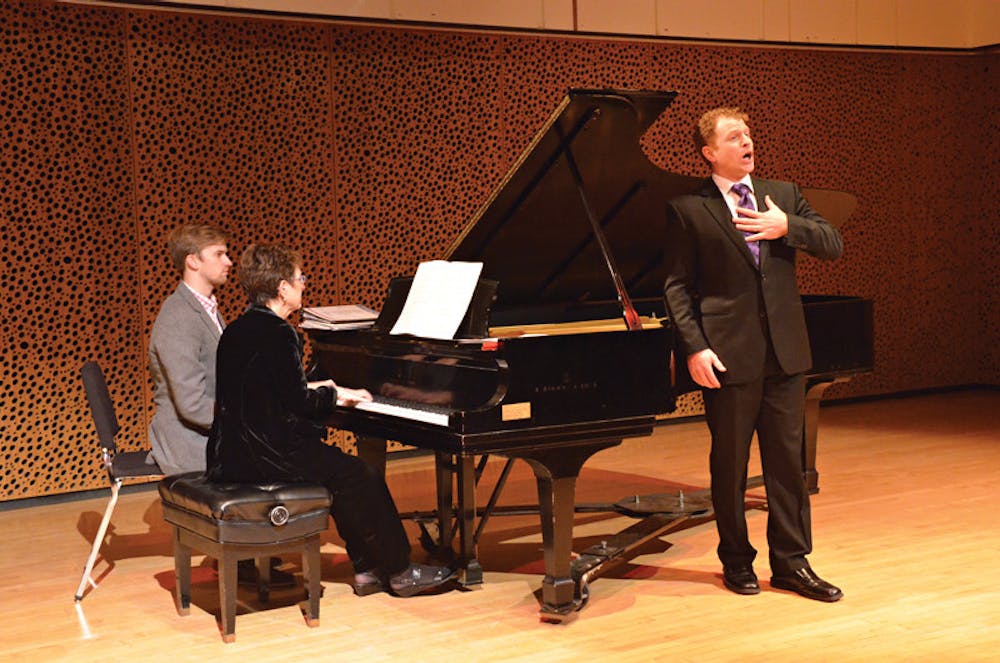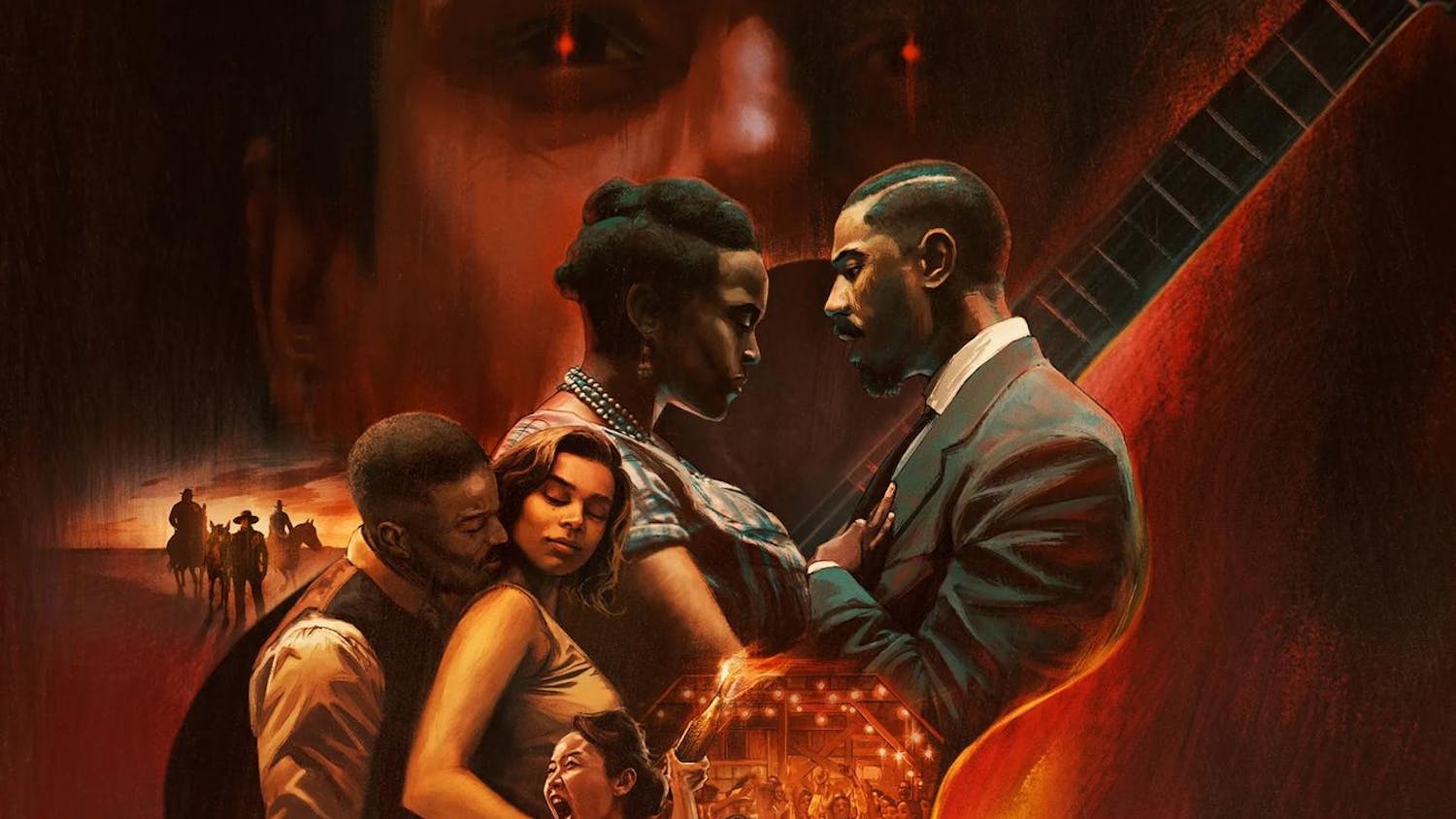The babble of approximately 20 audience members faded as baritone Andrew Garland, teaching associate for the music department, and accompanying pianist Donna Loewy set foot on stage to perform “American Portraits,” a recital featuring a repertoire of 20th- and 21st-century songs, Monday night.
The perforated walls of the Grant Recital Hall resounded with Garland’s impossibly long phrases, ranging from a whispered pianissimo to a booming forte. Loewy’s piano responded accordingly, transitioning between a quiet hum and crashing chords in a matter of seconds.
“A Reverie,” a selection from Senior Lecturer in Music Paul Phillips’ “Battle Pieces,” expressed thundering excitement that was as apparent in the reverberating music as it was on the performers’ faces. After each song, Garland and Loewy seemed to wake from a trance, their furrowed brows giving way to proud smiles at the audience’s applause.
The baritone Garland has played the piano since before junior high school, and he began singing with his school’s chorus during that period. When he began at the University of Massachusetts at Amherst, Garland recalled, he did not know he wanted to pursue music, but he auditioned for the chorus to continue singing as an extracurricular.
As soon as his audition ended, Garland said his professor immediately accepted him into the group and insisted that he take voice lessons. At 8 a.m. the next morning Garland received a call at his dorm from the director, asking again: “Did you sign up for voice lessons?”
“In one half-hour of voice lessons I made more progress than I did in 11 years of piano,” said Garland, who graduated with a degree in mass-music education and voice performance. To further his musical career, Garland pursued his masters at the Cincinnati College-Conservatory of Music, where he met his coach Loewy, who is an accompying pianist. Their first professional engagement together occurred when Garland received an invitation to play a recital in San Francisco while he was still at the conservatory, and Loewy volunteered to accompany him.
Independently, Garland has performed across the country with the Boston Lyric Opera, the Boston Baroque and Rufus Wainwright at the New York City Opera in 2009. According to his website, Garland has won a slew of competitions, including the Washington International Music Competition and the Opera Columbus Competition. In February 2013, he released his fourth CD, “American Portraits,” with Loewy.
Loewy started playing piano when she was six years old and continued throughout high school for every choir and musical she could find. Arriving at the State University of New York at Binghamton, Loewy recalled, she firmly believed she wanted to major in chemistry until she received a terrible grade on her first midterm. From then on, Loewy took classes across the music, psychology, theater and literature departments, finally turning her focus to music and earning a bachelor of arts in the subject.
Loewy continued on to receive a masters in accompanying from the University of Cincinnati, where she has taught since 1976, she said. Loewy’s work has carried her all across the globe, teaching everywhere from Israel to Italy, according to her website.
Loewy said she prefers playing classical music, as well as contemporary American and English songs with a romantic sound.
“I don’t like playing by myself,” Loewy said. “It’s lonesome. I get my thrill out of playing with other people.”
Garland said he primarily performs concerts, including other singers and a full orchestra, operas, in which costumes, lighting and a pit orchestra create a more dramatic performance or recitals, in which he and an accompanist perform an approximately hour-and-a-half-long set. Though he said choosing a favorite mode of performance would be akin to choosing a favorite among his children, he is most widely recognized for his recital work.
Though performing an established piece in a recital does not leave much opportunity to create new motifs or lyrics on the spot, collaborations are inherently improvisations, Garland said, referring to the way musicians respond to the nuances of their partners’ work for every performance.
“You might analogize it to a trapeze,” Phillips said. “With both performers, one is flying through the air and one is catching. They have to be aligned or else catastrophes will happen.” Both the pianist and the singer must find a balance between accompanying and coming to the forefront of the performance in order to draw the audience in, he added.
“We have something special by virtue of trust,” Loewy said.
The best collaborations arise when both musicians know exactly what the other is doing, Phillips said, adding that the audience benefits from Loewy and Garland’s extensive background performing together.
Because Garland lives in Boston and Loewy teaches in Cincinnati, the duo does not often rehearse together in person. Garland and Loewy last performed Monday’s set in Boston in July. Their preparation consists only of briefly playing through the whole material and then going over the most complex parts together more thoroughly.
Garland and Loewy have been performing together for 13 years and have released two albums together over that period. Garland and Loewy both said that live performance holds more excitement than recording sessions. The constant, unseen presence of a recorder puts enormous pressure to create a perfect track, Garland said, adding that no feedback or applause from the audience punctuates the performance. “You’re just in a dark room by yourself, playing in the air.”
With live performances, the connection between the performers and the audience is tangible. Loewy said she thrives on the spontaneity of the moment and the communication between her and her audience. “You can feel it in the air when you’ve got the audience in the palm of your hand, when you’ve dangled your phrases and they’re just waiting for the next note,” she said.
Garland said he has always been interested in teaching music at the university level. At Brown, he focuses on students’ vocal techniques through individual private voice lessons. Before Monday’s performance, he also taught a master class alongside Loewy. In master classes, an expert in a certain field teaches a group of students during a short workshop conducted in the presence of an audience, Philips said.
Garland performs at Brown once every two years, which ensures his recitals are infrequent enough that he does not “wear out his welcome” on campus, he said.
Monday’s set revolved around works from the 20th and 21st centuries, including music composed primarily by living American composers.
The repertoire is based in the classical tradition, but it incorporates improvisation and flavors of folk and jazz, Garland said, adding that the performance demonstrates how a genre influenced by old traditions can still have contemporary relevance.
“There are different specialties in playing piano — some people play solo repertoire, some people play concertos, but this art of playing with a singer takes a special talent,” Phillips said.

ADVERTISEMENT




